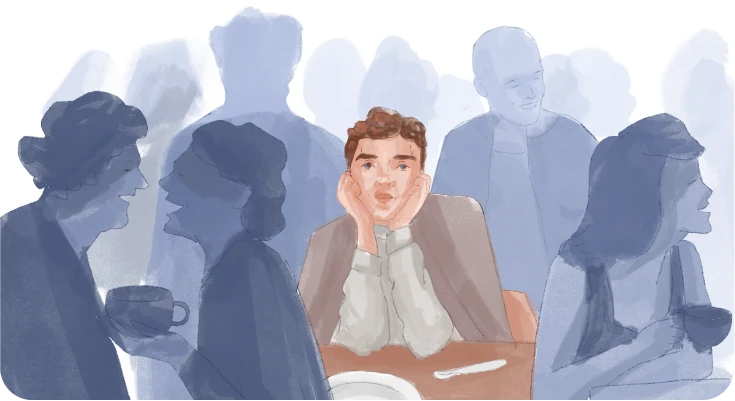You know those moments when a movie scene brings tears to your eyes? Maybe you feel overwhelmed in crowds or get super emotional over a beautiful piece of art.
The question “Why am I so sensitive?” might come up all the time. The reasons you are so sensitive could be genetic, past traumas, or overstimulation in a hectic world.
So, are you ready to explore the world of highly sensitive people? Let’s chat!
You might be a Highly Sensitive Person (HSP)
What is HSP? Introduced by psychologist Elaine Aron in her book “The Highly Sensitive Person: How to Thrive When the World Overwhelms You,” the term HSP describes people with a heightened sensitivity due to a more reactive nervous system.
HSPs experience the world with greater depth and detail, both the joys and the sorrows.
Sometimes, it’s hard to understand why others don’t seem to see or feel things the same way. That means we process information deeply and experience the world more intensely than others.
As English poet William Wordsworth said, “The world is too much with us.” It might be time to discover if “too much” is your reality.
It turns out that being highly sensitive isn’t so rare—1 in 5 people are like that. But there is nothing to worry about. It’s just a natural trait, like having green eyes or being left-handed.
Examples of HSP experience
You have probably heard, “Come on, don’t be that sensitive” or “Don’t take things personally.” Perhaps you’ve even asked yourself, “Why am I so sensitive to criticism?”
If that rings a bell, your sensitivity could be a sign that you’re a Highly Sensitive Person (HSP).
Of course, HSPs can have some struggles with sensory overload or emotional intensity, but they can also have empathy, creativity, and intuition to balance it out.
“Why am I so sensitive and cry easily?” HSPs often feel like they’re on a different wavelength than the rest of the world.
Being so sensitive is not always easy, but it definitely has its good sides. That’s where we can talk about emotional intelligence as a valuable tool for managing emotions.
For example, traits of a highly sensitive person are good at noticing details. Did your friend’s smile seem a little forced? Or maybe that song playing in the background has a weird note? Yes, you got it.
Various signs can indicate whether someone is highly sensitive. Some of these traits include being more self-aware, having empathy, trying to please others, and being sensitive to loud noises, chaotic scenes, and large groups of people.
Why am I So Sensitive?
“Am I too much for the world, or is the world too much for me?” ― Kelli Jae Baeli, Too Much World
The main question that makes us all curious is, “Why am I so sensitive to everything?”. It’s likely a combination of factors.
- Early traumatic experiences
- Genetics
- Life’s twists and turns
- You’re experiencing stress and anxiety
- You are empath
- You are going through loss and grief
- You are overly sensitive to pain
- Overstimulation
- Problems with physical well-being
So, what should you pay attention to? Let’s answer the “Why am I too sensitive?” question in detail:
1. Early traumatic experiences
Challenging experiences can profoundly affect us, making us more likely to feel overwhelmed or triggered in certain situations. So yes, past experiences, particularly traumatic events, can be a reason for your increased hypersensitivity to everything.
You may even ask, “Why do I hate myself?” Traumatic events like childhood trauma (including parentification trauma and enmeshment trauma) can be a root cause of someone being a highly sensitive person.
Also, trauma can lead to increased emotional reactions as the mind and body become more attuned to potential threats.
For example, you started to easily startle. Do you jump quickly at sudden noises, like a car backfiring, or movements, like someone unexpectedly tapping you on the shoulder? Yes, it may be a reason for you being HSP.
2. Genetics
Of course, genetics is one of the first reasons, “Why am I hypersensitive?” For instance, genetic studies have shown that some people may be more likely to have exaggerated emotional reactions than others. These genetic markers can influence brain activity, making some people more reactive to stimuli.
Some people are simply born with a more sensitive nervous system, experiencing emotions and the world around them more intensely.
Here’s a comment from Viviana Greco, PhD, “Research suggests that three sets of genes may play a significant role in HSP. These genes are associated with serotonin, which is involved in mood stabilization; dopamine, related to reward processing; and norepinephrine, involved in stress response.”
3. Life’s twists and turns
Even positive life changes, such as getting married, starting a new job, or moving to a dream location, can throw us off balance and leave us feeling more vulnerable. The excitement and anticipation of these events can be accompanied by stress, uncertainty, and a sense of loss for the familiar.
4. You’re experiencing stress and anxiety
“Why am I so sensitive lately?” The answer to this question might be rooted in your well-being, too. Stress and anxiety can exacerbate sensitivity, leading to heightened emotional reactions.
When the body is in a constant state of stress, it becomes more responsive to external stimuli. So it may be a reason for your “Why am I so sensitive to what others say”
5. You are empath
Traits associated with high sensitivity include being introspective, reflective, and empathetic. Feeling other people’s pain, like your best friend’s heartbreak, or joy, like your child’s excitement over a new toy, as if it were your own.
This deep empathy can sometimes be a cause of people pleasing as a trauma response, as highly sensitive persons may try to help others “suffering” or maintain positive emotions.
Or you are deeply moved by everything. Are you moved to tears by a beautiful sunset, like those vibrant colors over the ocean, or a touching song, like the one that reminds you of a lost loved one? You feel things on a deeper level, whether it’s joy, sadness, or anything in between.
6. You are going through loss and grief
Asking yourself, “Why am I so emotional lately?”. When we’re grieving, it’s natural to feel more emotional and sensitive. The death of a loved one, the end of a relationship, or other significant losses can leave us raw, making even everyday experiences feel overwhelming.
7. You are overly sensitive to pain
Why am I so sensitive and cry easily? You might have a lower pain tolerance than others. A headache or a paper cut might feel more intense for you.
8. Overstimulation
Loud noises, like the construction site outside your window, bright lights, like the fluorescent bulbs at the office, or busy schedules may feel like too much. So, overstimulation can be another answer to “Why am I so overly sensitive?”
9. Problems with physical well-being
The last but not the least reason for a highly sensitive person is physical health. When our bodies are under the weather, our emotional resilience can take a hit, too, making us more sensitive. For example, a simple cold can make us feel irritable and overwhelmed, while chronic pain can lead to feelings of depression and anxiety.
Highly sensitive person and other conditions
Now we know that feeling deeply, noticing subtle details, and getting overwhelmed easily are common traits of HSPs. However, these traits can also show up in other conditions. Knowing the difference is essential for getting the right help and support.
Introversion and HSP
Sure, both HSP and introverts might feel overwhelmed in a noisy place, but here’s the difference: introverts get tired mainly from too much social interaction. In contrast, HSPs get overwhelmed by any kind of intense stimulation.
Sensory Processing Sensitivity (SPS) and HSP
SPS is the scientific term for the trait of a highly sensitive person. People with SPS have a more sensitive nervous system, leading to deeper processing of sensory information.

Empathy and HSP
HSPs often have a high degree of empathy, meaning they can easily understand and share the feelings of others. While all empaths are considered highly sensitive persons, not all HSPs are empaths. The key difference lies in how deeply each experiences the emotions of others:
- If you’re deeply sensitive to your environment and human emotions but don’t necessarily take on the feelings of others, you might be an HSP.
- If you find yourself feeling overwhelmed by other people’s emotions, absorbing them like a sponge, and have strong intuitive abilities, you might be an empath.
Fibromyalgia and HSP
Some research suggests a potential link between HSP and fibromyalgia, a chronic pain condition. Both involve heightened sensitivity, but fibromyalgia is a medical condition with specific diagnostic criteria. For example, in fibromyalgia, it’s primarily physical pain, while in highly sensitive persons, it’s a broader range of stimuli.
HSP and ADHD
Have you ever noticed how both highly sensitive persons and those with ADHD symptoms seem to react strongly to things? It’s not just a coincidence. They actually share this trait of being easily overwhelmed by stimuli like noises, lights, or even emotions.
But their reasons for this heightened reactivity are different. HSPs feel things deeply and are more emotionally responsive, like picking up subtle cues in a room or getting overwhelmed by loud noises. It’s more about sensory and emotional processing.
HSPs might feel the world more intensely, while ADHD makes it harder to control that intensity.
So, while both may struggle in a loud or chaotic environment, their experiences are pretty different.
Highly sensitive persons might need quiet time to recharge, while people with ADHD might benefit from strategies to improve focus.
Autism Spectrum Disorder (ASD) and HSP
Both HSP and people with ASD can be sensory sensitive. However, ASD is a broader neurodevelopmental condition that may affect social skills, communication, and behavior, whereas high sensitivity is a personality trait characterized by increased emotional and sensory responsiveness.
For example, people with ASD often strugle with social interactions, like understanding body language, reading emotions, and connecting with others.
In contrast, highly sensitive persons may do well in social environments once they feel comfortable, but they can be greatly affected by small details and emotions (such as tone of voice, facial expression, or body language).
It’s important to remember that these are just potential similarities. If you’re concerned about your sensitivity or related symptoms, it’s always best to consult a healthcare professional for an accurate diagnosis and personalized guidance.
You can also take the “Am I neurodivergent” test to explore these traits further.
How to stop being sensitive?
Actually, this is the wrong question to ask. Sensitivity is a valuable trait that allows us to connect deeply with others and experience the world with greater nuance.
The goal isn’t to “delete” sensitivity but rather to manage it effectively and develop resilience.
Here are some tips to gain more control over your emotions and responses:
- Rest is a must. As a sensitive person, busy days can quickly drain your energy. Schedule downtime between activities. Spread out work and social events throughout the week to avoid exhaustion. Block off Sunday afternoons for relaxing walks in nature or curling up with a good book.
- Build Your “No” Muscle. Learn to say no to additional tasks, commitments, or unrealistic expectations of yourself. Prioritize what truly matters to you. Elaine N. Aron, discussing highly sensitive people, says, “Make good boundaries your goal. They are your right, your responsibility, your greatest source of dignity.” I think she’s got a point.
- There is no room for triggers. Steer clear of situations that cause undue stress, whether it’s a horror movie or a draining social interaction. Protect your energy. Skip the horror movie marathon if you know it will leave you feeling anxious and on edge for days.
- Create Your Zen Den. Transform your home or room into a haven of peace and comfort by investing in soft blankets, lighting candles with soothing scents, and decluttering your space.
- Practice Self-Care: As a highly sensitive person, prioritizing activities that nourish your mind, body, and spirit is a must. These might include meditation, spending time in nature, journaling, or pursuing creative hobbies.
Remember, mental health matters. If you need extra support, a therapist or counselor can be a true ally on your journey to emotional well-being.
Disclaimer
This article is for general informative and self-discovery purposes only. It should not replace expert guidance from professionals.
Any action you take in response to the information in this article, whether directly or indirectly, is solely your responsibility and is done at your own risk. Breeze content team and its mental health experts disclaim any liability, loss, or risk, personal, professional, or otherwise, which may result from the use and/or application of any content.
Always consult your doctor or other certified health practitioner with any medical questions or concerns
Breeze articles exclusively cite trusted sources, such as academic research institutions and medical associations, including research and studies from PubMed, ResearchGate, or similar databases. Examine our subject-matter editors and editorial process to see how we verify facts and maintain the accuracy, reliability, and trustworthiness of our material.
Was this article helpful?






